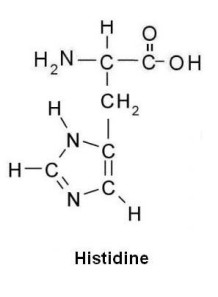Histidine (L-Histidine)
- Product Code: 32827
Histidine is one of 20 standard amino acids that are the building blocks of protein in the human body.
- -
- -
- -
- -
- -
- -
- -
- -
- -
- -
- -
- -
- -
- -
- -
- -
- -
- -
| Test Name | Specification |
|---|---|
| Appearance | White to slightly yellow crystalline powder |
| Content (on dry basis) | 98.5% Min |
| Loss on drying | 0.2% Max |
| Burning residue | 0.4% Max |
| Specific Rotation | +12 to +14 degree |
| pH | 7.0-8.5 |
| Heavy metals (Pb) | 15ppm Max |
| Sulfate (SO4) | 0.03% Max |
| Chloride (Cl) | 0.05% Max |
| Iron | 0.003% Max |
| Total number of bacteria | 2000CFU/g Max |
Histidine (L-Histidine)
Histidine is one of the 20 standard amino acids that are the building blocks of protein in the human body. Although histidine is an essential amino acid, This means that it must be obtained through the diet as the body cannot synthesize it. But histidine also plays many important roles in the body and is beneficial to health. Here are some important health benefits and functions of histidine:
Protein Synthesis: Histidine is an essential component of protein. And is involved in the synthesis of various proteins in the body. It is especially important during growth such as infancy and adolescence.
Histamine Production: Histidine acts as a precursor to histamine. It is a biological amine that plays an important role in immune responses and allergic reactions. Histamine is involved in various physiological processes. Including controlling stomach acid. nervous system transmission and immune system response
Tissue Repair: Histidine is involved in the repair and maintenance of tissues in the body. Essential for wound healing and overall tissue integrity.
Niacin (vitamin B3) synthesis: Histidine is used in the synthesis of niacin (vitamin B3) in the body. Niacin is required for various metabolic processes. and helps maintain healthy skin, nerves, and digestive system.
Antioxidant Properties: Histidine has antioxidant properties and can help protect cells from oxidative stress and damage caused by free radicals.
Metal chelation: Histidine has the ability to chelate or bind to certain metal ions. This can help control the presence of these ions in the body and prevent the buildup of toxins.
Brain function: Histidine is involved in neurotransmission and may play a role in brain health and cognitive function.
Immune system support: Histidine plays a role in histamine production. It can help modulate the immune response and may play a part in the body's defense against germs.
Be the first to review this product :-)
Recommend Lab-Service
| Lab Service | Price |
|---|
Histidine is one of 20 standard amino acids that are the building blocks of protein in the human body.
Histidine (L-Histidine)
Histidine is one of the 20 standard amino acids that are the building blocks of protein in the human body. Although histidine is an essential amino acid, This means that it must be obtained through the diet as the body cannot synthesize it. But histidine also plays many important roles in the body and is beneficial to health. Here are some important health benefits and functions of histidine:
Protein Synthesis: Histidine is an essential component of protein. And is involved in the synthesis of various proteins in the body. It is especially important during growth such as infancy and adolescence.
Histamine Production: Histidine acts as a precursor to histamine. It is a biological amine that plays an important role in immune responses and allergic reactions. Histamine is involved in various physiological processes. Including controlling stomach acid. nervous system transmission and immune system response
Tissue Repair: Histidine is involved in the repair and maintenance of tissues in the body. Essential for wound healing and overall tissue integrity.
Niacin (vitamin B3) synthesis: Histidine is used in the synthesis of niacin (vitamin B3) in the body. Niacin is required for various metabolic processes. and helps maintain healthy skin, nerves, and digestive system.
Antioxidant Properties: Histidine has antioxidant properties and can help protect cells from oxidative stress and damage caused by free radicals.
Metal chelation: Histidine has the ability to chelate or bind to certain metal ions. This can help control the presence of these ions in the body and prevent the buildup of toxins.
Brain function: Histidine is involved in neurotransmission and may play a role in brain health and cognitive function.
Immune system support: Histidine plays a role in histamine production. It can help modulate the immune response and may play a part in the body's defense against germs.
| Mechanism | - |
| Appearance | - |
| Longevity | - |
| Strength | - |
| Storage | - |
| Shelf Life | - |
| Allergen(s) | - |
| Dosage (Range) | - |
| Recommended Dosage | - |
| Dosage (Per Day) | - |
| Recommended Dosage (Per Day) | - |
| Mix Method | - |
| Heat Resistance | - |
| Stable in pH range | - |
| Solubility | - |
| Product Types | - |
| INCI | - |
Cart
No products



